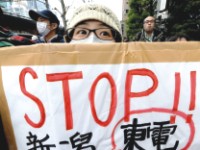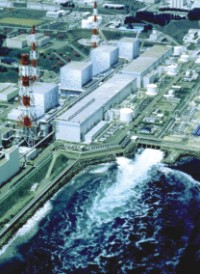| Home - Back Issues - The Team - Contact Us |
 |
| Volume 10 |Issue 14 | April 08, 2011 | |
|
|
International But Nuke Power will Still Prevail Ravi Velloor The disabling of a nuclear power plant in Japan after an earthquake struck is certain to bring new thinking on the issue. This has been flagged by the extreme measures the Japanese authorities have used at the Fukushima Daiichi plantpumping in impure sea water that will ruin the reactor core so as to reduce heat build-up and prevent a meltdown.
Although this reactor, which dates back 40 years, was due to be retired by the end of March, another two units at the plant have also been flooded with sea water. Fukushima will be written off. The message in Japan's unconventional approach is that a meltdown had to be stopped, by any means. Operators of reactors with years of service left would see a lesson here. After the Chernobyl meltdown in 1986, the Soviets permanently entombed the plant with a concrete shell to seal in radioactive matter. Nuclear generation of electricity is quite new, begun only in 1954 in the Soviet Union. The Fukushima incident will inspire a dynamic science to come up with new safety designs to make backups to cooling systems failure-proof. Backup failure was an unforeseen deficiency in the Japanese case. The good that will come of it is that it will be noted. Next, the question of locating nuclear plants in seismologically unstable regions will provoke new debate. The scientific feasibility had actually been determined in Japan's case. This is why the Fukushima case will have experts scrambling as the plant had been built to withstand quakes. The building stood up well. It was the resultant tsunami which knocked out the cooling system. This is a new challenge. Henceforth, quake-prone countries planning reactors, like Indonesia, can expect rigorous scrutiny by the International Atomic Energy Agency. Going nuclear would be discouraged of nations that lack an advanced technological base and the ability to produce nuclear scientists and technicians. Nuclear power's future, however, will probably survive this calamity, provided its lessons are absorbed. This is because use of depleting fossil fuels to generate energy will have to end. More nations are thus investing in nuclear plants. This form of energy ironically is 'clean', a natural alternative together with other renewable sources as global warming becomes the concern of the age. Japan is the world's third most nuclear intensive nation in terms of operating reactors. It depends on nuclear power more than does America, but less than France. The thinking on the issue has shifted over the years from one of dogmatic opposition on safety grounds, to the more helpful line of trying to make its production safer. Asia, the region with the world's most frenetic nuclear reactor building programme, seems determined to ride out the storm and carry on. Indeed, it may have little choice in the matter. From Manila to New Delhi, governments had been increasingly looking to nuclear power as a solution to cut dependence on fossil fuels and the pressure to reduce carbon- emitting fuels that damage the environment. Little wonder that most of the 155 reactors planned or being built are in Asia. Although there is no nuclear power plant operating in Southeast Asia, almost every member, with the exception of oil rich Brunei and tiny Laos, are pondering the merits of adding nuclear power to the energy grid. Vietnam plans eight nuclear power plants by 2030, producing as much as 16,000MW of power. Indonesia plans four plants producing 6,000MW by 2025. For many neighbouring nations, there is nothing more worrisome than an accident in a future nuclear plant on the main island of Java, especially in seasons when the wind is blowing northwards. The meltdown at Fukushima has come as a nightmare for national leaders and economic planners, who now have to factor in additional safeguards. They also have to assuage mounting concerns among a leery public who remain to be convinced about the merits and safety of nuclear power. In Europe as well as the United States, calls have been made for governments to halt the expansion of nuclear power plants. Germany has ordered a provisional shutdown of some of its nuclear reactors until a three-month review is completed, and Switzerland has already put a halt to its plans.
Yet, with energy consumption growing apace, Asian governments cannot rule out the nuclear option, however dangerous it may seem. Malaysia, which is eyeing its first nuclear plant by 2021, has said the disaster in Fukushima will not affect the country's plans. But energy, green technology and water minister Peter Chin, in a tilt to public sentiment, said: “The government will not do it secretly without informing the public.” Indonesian legislator Satya Yudha, from parliament's commission VII, which looks at energy issues, said the government should not “write off” nuclear energy because of Japan. “Sooner or later, we will need it,” he said. “The government's task is to look at diversifying energy sources because without secure energy supply we cannot advance. In the meantime, we need to educate people properly about nuclear energy.” Besides, said Ferhat Aziz, a spokesman for the Indonesian nuclear energy agency, Indonesia is better prepared today than Japan and South Korea were at the start of their civilian nuclear energy programmes. He told The Straits Times that the agency was looking closely at possible plant locations. These include Bangka- Belitung province off the east coast of Sumatra, the island of Kalimantan and the Muria Peninsula on the northern coast of Central Java. In India, which has announced plans to spend some US$175 billion on building nuclear plants over the next 20 years, the Nuclear Power Corp (NPC) is reviewing safety at its 20 nuclear plants across the country. “This event will be a big dampener for our programme,” says Shreyans Jain, head of the NPC. China is set to add 10 to 27 nuclear reactors over the next five years. “China has to learn lessons from the accident in Japan but will not give up on nuclear energy,” says Zhang Lijun, China's vice-minister for environment. Countries such as China and India may have little choice. World energy consumption still hugely dependent on fossil fuelsis rising by the day. The International Energy Agency says Asean's energy demand is going up at a rate of 3.3 per cent a year, compared with 2.5 per cent elsewhere. Alternative energy sources such as solar, wind and biomass can fill only so much of the gap and oil wells are drying up faster than the world can discover new sources. It is for this reason that no significant nation in the world can really write off nuclear energy. But tell that to the man in the street. This week, a Malaysian microblogger summed up the scepticism that many Asians feel about the arguments for nuclear energy. “I am quite happy to see Malaysia build a nuclear power plant,” he wrote on Twitter, “as long as it is built next to the prime minister's house”. With reports from Lynn Lee in Jakarta, Teo Cheng Wee in Kuala Lumpur, Grace Ng in Beijing,
Copyright
(R) thedailystar.net 2011 |

